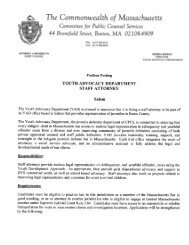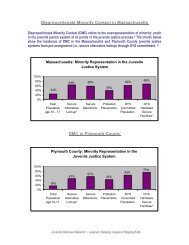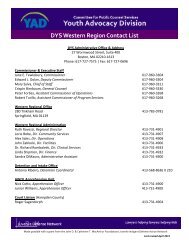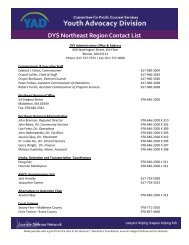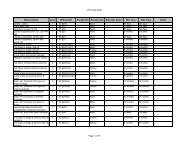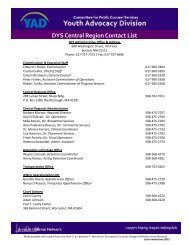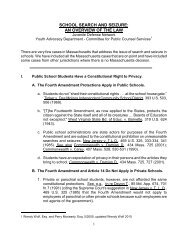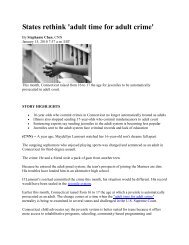description of available trainings - the Youth Advocacy Division
description of available trainings - the Youth Advocacy Division
description of available trainings - the Youth Advocacy Division
Create successful ePaper yourself
Turn your PDF publications into a flip-book with our unique Google optimized e-Paper software.
JUVENILE DEFENSE NETWORK<br />
AVAILABLE TRAININGS<br />
Below is a <strong>description</strong> <strong>of</strong> <strong>the</strong> <strong>trainings</strong> that have been developed by <strong>the</strong> Juvenile Defense<br />
Network (JDN) to date. Most <strong>trainings</strong> include a PowerPoint presentation and copies <strong>of</strong><br />
substantive legal outlines, sample motions, and relevant publications.<br />
1. Miranda – This training, which is conducted in tandem by a juvenile defense<br />
attorney and a forensic psychologist, provides an overview <strong>of</strong> <strong>the</strong> substantive law<br />
<strong>of</strong> Miranda waivers in juvenile cases, along with relevant psychological research<br />
and child development issues related to waivers <strong>of</strong> Miranda. Particular emphasis is<br />
placed on <strong>the</strong> use <strong>of</strong> experts and <strong>the</strong> impact <strong>of</strong> adolescent development on a<br />
juvenile’s ability to make a knowing, intelligent and voluntary waiver <strong>of</strong> Miranda<br />
rights and engage in a meaningful consultation with an interested adult.<br />
2. School Search and Seizure and Related Consequences – This training provides<br />
an overview <strong>of</strong> <strong>the</strong> substantive law and related educational consequences <strong>of</strong><br />
school search and seizure cases. The objective is to enhance practitioners’ ability<br />
to defend school search and seizure cases, whe<strong>the</strong>r <strong>the</strong> search is conducted by<br />
police, school administrators or both. An overview <strong>of</strong> related suspension/expulsion<br />
hearings, relevant case law from o<strong>the</strong>r jurisdictions and practice tips are also<br />
provided.<br />
3. Probation Surrenders – This training focuses on <strong>the</strong> procedural and legal<br />
requirements <strong>of</strong>, as well as strategies for preventing, juvenile probation surrender<br />
hearings. The objective is to encourage practitioners to advocate for probation<br />
conditions that are tailored to <strong>the</strong> specific needs <strong>of</strong> <strong>the</strong>ir individual clients so that<br />
<strong>the</strong>ir clients might avoid <strong>the</strong> violations that are so common in juvenile court<br />
practice. Particular emphasis is placed on <strong>the</strong> impact <strong>of</strong> adolescent development<br />
on a juvenile’s ability to comply with probation conditions. The training also<br />
provides practitioners with tips on preparing for, litigating and appealing <strong>the</strong><br />
hearing.<br />
4. Juvenile Dispositions – This training provides an overview <strong>of</strong> <strong>the</strong> dispositions<br />
<strong>available</strong> to <strong>the</strong> court in delinquency and youthful <strong>of</strong>fender cases as well as DYS<br />
commitment proceedings.<br />
5. <strong>Youth</strong>ful Offender (YO) Cases - This training provides an overview <strong>of</strong> <strong>the</strong> youthful<br />
<strong>of</strong>fender law and relevant cases. YO-specific motion practice and procedural<br />
issues are also addressed.<br />
6. Adolescent Brain Development and Implications in <strong>the</strong> Courtroom – This<br />
training provides an overview <strong>of</strong> <strong>the</strong> “hard” science and developmental science <strong>of</strong><br />
adolescent brain development along with a discussion on how lawyers can use this<br />
information in <strong>the</strong>ir daily practice.
7. Competency - This training is conducted in tandem with an attorney and a forensic<br />
psychologist. The law on competency is discussed, along with <strong>the</strong> “red flags”<br />
lawyers should be looking for. There is also a discussion <strong>of</strong> <strong>the</strong> research in this<br />
area and how a competency evaluation is conducted.<br />
8. DYS <strong>Advocacy</strong> – The purpose <strong>of</strong> this training is to increase participants’<br />
knowledge <strong>of</strong> what specifically happens to youth who are committed to DYS and<br />
what role lawyers can and should play in this process.<br />
9. Collateral Consequences – This training discusses <strong>the</strong> consequences <strong>of</strong> juvenile<br />
adjudications such as enhanced sentencing, school suspension and expulsion, and<br />
how juvenile adjudications can affect entrance into <strong>the</strong> military and federal student<br />
financial aid. This training also addresses record expungement and sealing, and<br />
how delinquency adjudications can lead to drivers license suspensions.




